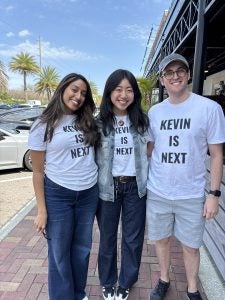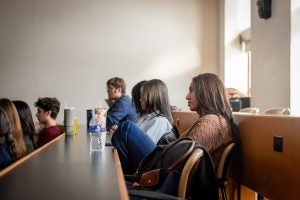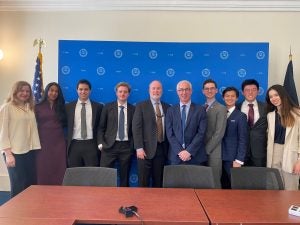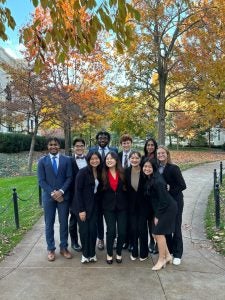
“I am reminded that without the people, Georgetown is just a building. There’s nothing quite like sitting in your living room with all your closest friends playing games, and, every once in a while, asking a question that makes everyone pause and think about what life is. Those moments remind me what it is to be human, to be vulnerable, funny and free,” says Naina Bhamidipati (SFS’25). The global business major from Tucson, Arizona, came to the School of Foreign Service with an interest in law, but at Georgetown, she found experiences and mentors that helped her distill it into a purpose: to dismantle injustice in the legal system.

This purpose took root in the Making an Exoneree class, taught by Professors Marc Howard and Marty Tankleff, where Bhamidipati and her two friends reinvestigated the case of Kevin Herrick, a man who has spent 36 years in prison. They combed through court records, analyzed police reports and built a relationship with Kevin and his family. As part of their advocacy, they produced a documentary about his case and are currently working with journalists on a podcast series dedicated to his story. Working on the case has been a transformative experience for Bhamidipati that reshaped how she viewed the justice system and her place within it. It has also inspired her to commit to this work for her future.
Transferable skills with theoretical and practical analysis
Bhamidipati’s global business major also stems from her interest in criminal justice: “I chose my major because I wanted to study how corporate structures in various countries affect their respective criminal legal systems,” she explains. The major, which includes classes in SFS and the McDonough School of Business (MSB), allowed her to combine economic analysis with ethical inquiry.

“SFS has given me the legitimacy and the applicable argumentative, writing and reading skills that I will need to be successful in my ride to becoming a lawyer. It has given me my purpose in life, which is to get Kevin, and others like him, out of prison, and right the wrongs of the criminal legal system,” Bhamidipati says.
Bhamidipati is currently conducting research with Dr. Renee Kathwalla studying how police departments respond to racial sensitivity training, part of a broader effort to understand not just individual bias, but the institutional mechanisms that reinforce it: “SFS gave me the skills to not only analyze what’s wrong with the system, but to actually do something about it.”
Mentors that inspire and guide
Bhamidipati found mentors among the faculty and staff at the two schools that empowered her to forge an unconventional path. Professor Marc Busch, Karl F. Landegger Professor of International Business Diplomacy, once told her, “‘Get comfortable being stupid; that’s the only way you’ll learn anything.’”

That advice gave her the courage to confront institutions and structures that are often trusted without question: “When you push back against judges, prosecutors and police, you’re not just criticizing individuals—you’re challenging entire systems,” she says. “But my professors believed in me, and their trust helped me believe in myself.”
Through her work as a research assistant for Professor Catherine Tinsley, Raffini Family Professor and Management Area Chair in the McDonough School of Business, Bhamidipati found herself grading MBA assignments, advising negotiations and helping teach material to graduate students, an experience that affirmed her ability to succeed in high-stakes environments.
Bhamidipati explains, “[Tinsley] cheered for me so loud, I never heard who didn’t—she has made what felt like a very unconventional and scary path for me feel safe.”
After graduation, Bhamidipati will join the law firm Skadden, Arps, Slate, Meagher, & Flom LLP and Affiliates as a paralegal. She credits Patricia Grant, senior associate dean of the undergraduate program in the McDonough School of Business, with being an important mentor who shaped her sense of agency: “Dean Grant has taught me to advocate for myself. She recognizes the reality that as a young, daring woman of color, people will not want to offer you platforms, and she has taught me to unabashedly build my own.”
“Unapologetically opinionated and educated about their opinions”
Bhamidipati’s time at Georgetown was also nourished by the community of her fellow students who share her commitment to fighting for truth and justice.

She says, “SFS students are unapologetically opinionated and educated about their opinions, regardless of what they might be, which is rare and refreshing.”
She found herself challenged and supported by her peers who helped her continue to learn, investigate her beliefs and admit when she was wrong.
“Though Georgetown is often celebrated for its academic rigor, my Georgetown is one of belly laughs, rich friendships, bright conversations and warmth in love. The people at Georgetown cultivate the soul as much as they do the mind,” Bhamidipati says.
Leaving the Hilltop, Bhamidipati will carry with her the spirit of Georgetown: “It is this constant challenge—to question myself, my assumptions and the systems around me—that I will miss experiencing everyday.”